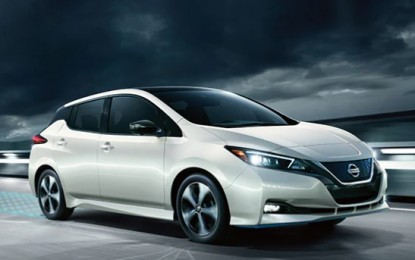
Nissan Leaf, the world's first mass-produced electric vehicle (Photo courtesy of Nissan Motor Corp.)
MANILA – A Nissan-commissioned study by market research firm Frost & Sullivan shows that Indonesia, the Philippines, and Thailand are the top three nations in Southeast Asia with the highest inclination in adopting electric vehicles.
At the Nissan FUTURES—Electrification and Beyond virtual event Thursday, Frost & Sullivan associate partner and senior vice president for intelligent mobility Vivek Vaidya said one in three customers in Asean is still certain to consider purchasing an electric vehicle as their next car purchase in the next three years.
Electric vehicles run fully on battery such as battery electric vehicles, plug-in hybrid, and vehicles using e-Power technology.
“This is on the back of Covid-19 (coronavirus disease 2019). When people lost their jobs, there are deductions in incomes, there were laying off (workers), people are working from home, and more importantly, the oil reached (an) all-time low,” Vaidya said.
He added that the survey also showed a significant lowering of barriers for Asean consumers to purchase electric vehicles from the last survey in 2018.
Although now tamed, among the top concerns of consumers in buying electrified vehicles include fear of running out of power, availability of charging infrastructure, and safety of these vehicles.
Vaidya said this is a positive development in the e-vehicle market in Asean.
"Our findings show that consumers generally value the overall driving experience of an electrified vehicle, given their innovative and high-technology features matched with high-performance engines. Over time, increased environmental awareness, lower maintenance costs for an electrified vehicle, coupled with tax incentives and improved public and private charging facilities, will be key motivators for consumers to possibly switch to electrified vehicles, and purchasing one in the near future," he added.
Nissan regional vice president for Asean Isao Sekiguchi said the company is encouraged by the development in the perception of Southeast Asian consumers to e-vehicles.
The study identified the top three factors that will motivate consumers to buy electric vehicles. These are better safety standards, environmental awareness, and the low cost of charging the vehicle.
It added there is a growing environmental awareness across Southeast Asian consumers that their adoption of electric vehicles will contribute to environmental protection.
"As the pioneer in electrified mobility, Nissan is delivering on its commitment to making electrified mobility more accessible to more people. We have already introduced electrified vehicles to Singapore, Malaysia, Thailand, and Indonesia, as well as to Hong Kong,” Sekiguchi said.
The company is also expected to introduce the Nissan Leaf in the country this year, its Philippine president and managing director Atsushi Najima earlier said.
To develop the e-vehicle ecosystem in respective Asean countries, extending incentives from manufacturers to consumers will perk up demand for e-vehicles.
Collaboration between public and private sectors is also needed to make charging infrastructure available in different areas in the country.
Likewise, non-financial benefits for consumers such as free parking and exemption from number and color-coding will encourage consumers to purchase electric vehicles. (PNA)
